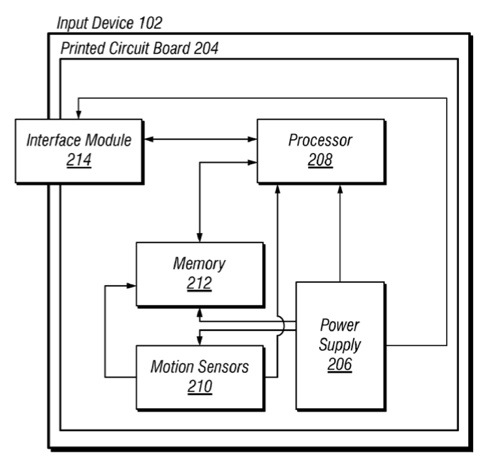An Apple patent (number 7,757,186) has appeared at the US Patent & Trademark Office that shows that Apple is far from finished when it comes to innovative ways to control its various devices.
The patent is for motion plane correction for MEMS-based input devices. The invention relates to technology for monitoring motion of electronic input devices, and more particularly to technology for motion plane correction of motion-based input devices. The inventor is Farshid Moussavi.
Here’s Apple’s background and summary of the invention: “Conventional input devices, such as computer mice, typically employ optical sensors, track wheels or track balls to control the motion of a cursor or other navigational object on a computer display screen. Other types of input devices that measure a force imparted onto the input device typically incorporate one or more accelerometers for sensing acceleration forces exerted on the input device as it is moved by a user. A velocity of the electronic input device may be calculated and estimated by integrating the measured acceleration over time, and a position estimate of the input device may be calculated by integrating its velocity over time. In this way, motion of an accelerometer-based input device may be translated to motion of a cursor or other navigational object on a computer display screen.
“However, many existing methods for tracking two-dimensional motion with accelerometer-based devices do not adequately take into account variations in three-dimensional orientation. For example, an orientation change of only about 0.5 degrees from the horizontal plane can contribute up to 10 mG acceleration in a plane of motion, which can be significant with respect to human initiated motion. Therefore, there is a need for systems and methods that account for a tilt in a plane of motion so as to provide a result that is more indicative of a user’s intended motion of the input device.
“Embodiments of the present invention are directed to methods and apparatuses for reducing or eliminating tracking errors associated with moving an accelerometer based tracking device, or other force based tracking devices, at a tilt with respect to a plane normal to the direction of the gravitational force.
“Embodiments of the present invention are directed to motion-based input devices and provide a method and system for correcting errors in acceleration measurements due to a deviation from a horizontal plane of motion by correcting for a gravitational acceleration components due to the deviation in the plane of motion. In one embodiment, the invention provides a system and method for determining an angle of tilt (tilt angle) of the plane of motion, and correcting for gravitational acceleration if the tilt angle is not excessively large.
“In one embodiment, the invention provides a method for compensating for a tilted plane of motion for a motion-based input device. The method comprises, calculating a total acceleration of the electronic input device in a tilted plane of motion, calculating an angle of tilt of the tilted plane of motion, and estimating an error in the total acceleration of the electronic input device in the plane of motion due to the angle of tilt. The method further includes correcting the acceleration of the electronic input device based on the estimated error to obtain a corrected acceleration of the electronic input device.
“In another embodiment, the invention provides an electronic input device that includes a motion sensing element operable to measure a motion of the electronic input device to obtain a motion input. The electronic input device further includes a processing element operable to: receive measured motion parameters, calculate a total acceleration of the electronic input device in a tilted plane of motion, calculate an angle of tilt of the tilted plane of motion, estimate an error in the total acceleration of the electronic input device in the tilted plane of motion due to the angle of tilt, and correct the acceleration of the electronic input device based on the error to obtain a corrected acceleration of the electronic input device. The electronic input device also includes an external interface operable to send the output to an external device (e.g., a computer).
“In a further embodiment, the invention provides a computer-readable medium comprising program code for compensating for a tilted plane of motion for a motion-based input device. The computer-readable medium includes program code for obtaining motion parameter, calculating a total acceleration of the electronic input device in a tilted plane of motion, and an angle of tilt of the tilted plane of motion, and estimating an error in the total acceleration of the electronic input device in the tilted plane of motion due to the angle of tilt. The computer-readable medium also comprises program code for correcting the total acceleration of the electronic input device based on the error to obtain a corrected acceleration of the electronic input device.”
— Dennis Sellers

